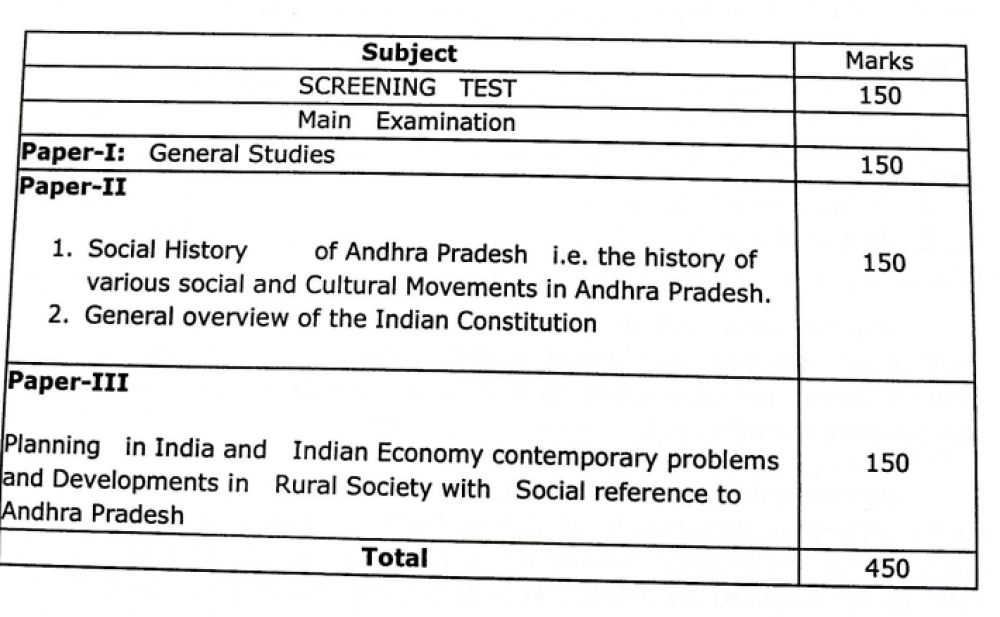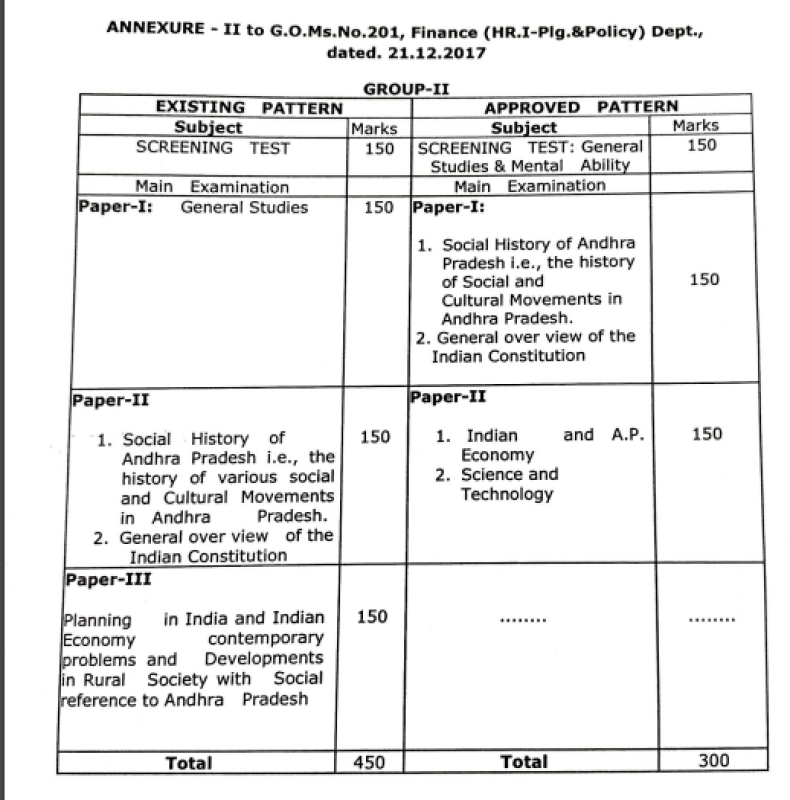APPSC Syllabus 2024 (Group 1, 2, 3) | Exam Pattern, PDF Download
The Andhra Pradesh Public Service Commission (APPSC) conducts various recruitment exams for government positions in the state of Andhra Pradesh. The APPSC exam mode is online and computer-based, making it convenient for candidates to take the test from any location. The exam level is for graduates, and the exam type is objective, consisting of multiple-choice questions (MCQs). The paper medium for the exam is English only, and the total number of questions is 150, with each question carrying one mark.
The subject name for the exam is General Studies, which covers a wide range of topics such as current affairs, history, geography, economics, science, and technology. Candidates who answer all questions correctly can obtain a total of 150 marks in the APPSC exam.
Screening Test
Organization
APPSC
Exam Mode
Online (CBT)
Exam Level
Graduate
Exam Type
Objective (MCQ)
Paper Medium
English Only
Total Question
150
Total Marks
150
Correct Answer (Marks)
01
Subject Details
1. 📖General Studies
- Ancient History:
- Salient features of Indus Valley Civilization
- Vedic age
- Emergence of Buddhism and Jainism
- Mauryan Empire
- Gupta Empire
- Harshavardhana and his Achievements
- Medieval History:
- The Chola Administrative System
- Delhi Sultanate
- The Mughal Empire
- Bhakti and Sufi Movements
- Shivaji and the rise of Maratha Empire
- Advent of Europeans
- Modern History:
- 1857 Revolt and its Impact
- Rise and Consolidation of British Power in India
- Changes in Administration, Social and Cultural Spheres
- Social and Religious Reform Movements in the 19th and 20thCentury
- Indian National Movement: its various stages and important contributors and contributions from different parts of the country
- Post Independence Consolidation and Reorganization within the country
- Geography:
- General and Physical Geography
- Economic Geography of India and AP
- Human Geography of India and AP
- Indian Society:
- Structure of Indian Society
- Social Issues
- Welfare Mechanism
- Current Affairs:
- Major Current Events and Issues pertaining to International, National and State of Andhra Pradesh
- Mental Ability:
- Logical Reasoning (Deductive, Inductive, Abductive)
- Mental Ability
- Basic Numeracy
- Data Analysis (Tables, bar diagram, Line graph, Pie-chart)
Mains Exam Paper 1
Organization
APPSC
Exam Mode
Online (CBT)
Exam Level
Graduate
Exam Type
Objective (MCQ)
Paper Medium
English Only
Total Question
150
Total Marks
150
Correct Answer (Marks)
01
Subject Details
1. 📖Social and Cultural History of Andhra Pradesh
Section A - Social and Cultural History of Andhra Pradesh:
- Pre-Historic Cultures
- The Satavahanas
- The Ikshvakus
- Socio-Economic and Religious Conditions of the Satavahanas and Ikshvakus
- Literature, Art, and Architecture of the Satavahanas and Ikshvakus
- The Vishnukundins
- The Eastern Chalukyas of Vengi
- Andhra Cholas
- Society and Religion of the Vishnukundins, Eastern Chalukyas, and Andhra Cholas
- Telugu Language, Art, and Architecture of the Vishnukundins, Eastern Chalukyas, and Andhra Cholas
- Major and minor dynasties that ruled Andhradesa between the 11th and 16th centuries A.D.
- Socio-Religious and Economic Conditions of Andhradesa between the 11th to 16th centuries A.D.
- Growth of Telugu Language and Literature, Art, and Architecture in Andhradesa between the 11th to 16th centuries A.D.
- Advent of Europeans
- Trade centers
- Andhra under the Company
- 1857 Revolt and its Impact on Andhra
- Establishment of British Rule
- Socio-Cultural Awakening
- Justice Party/Self-Respect Movement
- Growth of the Nationalist Movement in Andhra between 1885 to 1947
- Role of Socialists, Communists, Anti-Zamindari, and Kisan Movements
- Growth of Nationalist Poetry, Revolutionary Literature, Nataka Samasthalu, and Women's Participation
- Origin and Growth of the Andhra Movement
- Role of Andhra Mahasabhas
- Prominent Leaders of the Andhra Movement
- Events leading to the formation of Andhra State in 1953
- Role of Press and News Papers in the Andhra Movement
- Role of Library Movement and Folk and Tribal Culture
- Events Leading to the Formation of Andhra Pradesh State
- Visalandhra Mahasabha
- States Reorganization Commission and its Recommendations
- Gentlemen Agreement
- Important Social and Cultural Events between 1956 to 2014.
2. 📖Indian constitution
- Nature of the Indian Constitution
- Constitutional Development in India
- Salient Features of the Indian Constitution
- The Preamble of the Indian Constitution
- Fundamental Rights and their significance
- Directive Principles of State Policy and their relationship with Fundamental Rights
- Fundamental Duties of Indian Citizens
- Amendment process of the Constitution
- Basic Structure of the Constitution
- Structure of the Indian Government
- Functions of Legislative, Executive, and Judiciary in India
- Types of Legislatures in India - Unicameral and Bicameral
- Executive structure of India
- The parliamentary system in India
- Judicial Review and Judicial Activism in India
- Distribution of Legislative and Executive Powers between the Union and States
- Legislative, Administrative, and Financial Relations between Union and States
- Powers and Functions of Constitutional Bodies in India
- Human Rights Commission and its Role in India
- Right to Information (RTI) in India
- Lokpal and Lok Ayukta in India
- Center-State Relations and the Need for reforms
- Rajmannar Committee, Sarkaria Commission, and M.M.Punchchi Commission in India
- Unitary and Federal Features of Indian Constitution
- Indian Political Parties and Party System in India
- Recognition of National and State Parties in India
- Elections and Electoral Reforms in India
- Anti-Defection Law in India
- Centralization Vs Decentralization in India
- Community Development Programme in India
- Balwant Rai Mehta Committee and Ashok Mehta Committees in India
- 73rd and 74th Constitutional Amendment Acts and their Implementation in India.
Mains Exam Paper 2
Organization
APPSC
Exam Mode
Online (CBT)
Exam Level
Graduate
Exam Type
Objective (MCQ)
Paper Medium
English Only
Total Question
150
Total Marks
150
Correct Answer (Marks)
01
Subject Details
1. 📖Indian and AP Economy
Structure of Indian Economy, Economic Planning, and Policy:
- Mixed economy with private and public sectors
- Government plays a significant role in shaping economic policies
- Economy divided into agriculture, industry, and services sectors
- National income measured through income, expenditure, and production methods
- Occupational pattern dominated by agriculture
- Shift towards services sector
- Planning strategies include five-year plans and NITI Aayog
Money, Banking, Public Finance, and Foreign Trade:
- Money supply and monetary policy regulated by RBI
- Indian banking system divided into commercial, cooperative, and development banks
- Inflation caused by demand-pull and cost-push factors
- Fiscal policy includes revenue and expenditure decisions
- Indian tax structure includes income tax, excise duty, and GST
- Balance of payments records transactions between India and the world
- Foreign direct investment made by foreign companies in India
Agricultural Sector, Industrial Sector, and Services in Indian Economy:
- Agriculture critical sector, employing a significant portion of the population
- Policies and programs implemented to promote agricultural growth, such as MSP and procurement system
- Industrial sector marked by small-scale and large-scale industries
- Services sector fastest-growing sector, with IT and ITES industries contributing significantly to growth
Structure of Andhra Pradesh Economy and Public Finance:
- Services sector contributes significantly to the economy
- Per capita income higher than national average
- Schemes and programs implemented to promote economic growth
Agriculture and Allied Sector, Industrial Sector, and Services Sector of Andhra Pradesh:
- Agriculture characterized by crops such as rice, cotton, and sugarcane
- Policies and programs implemented to promote agricultural growth, such as Rythu Bharosa scheme
2. 📖Science and Technology
Section B – Science and Technology:
- Technology Missions, Policies and Applications:
- National S&T Policy
- Recent Science, Technology and Innovation Policy
- National Strategies and Missions
- Emerging Technology Frontiers
- Space Technology: Launch Vehicles of India
- Recent Indian Satellite Launches and its applications
- Indian Space Science Missions
- Defence Technology: Defence Research and Development Organization (DRDO)
- Structure, Vision and Mission of DRDO
- Technologies Developed by DRDO
- Integrated Guided Missile Development Programme (IGMDP)
- Information and Communication Technology (ICT)
- National Policy on Information Technology
- Digital India Mission: Initiatives and Impact
- E-Governance Programmes and Services
- Cyber Security concerns
- National Cyber Security Policy
- Nuclear Technology: Indian Nuclear Reactors and Nuclear Power Plants
- Applications of Radioisotopes
- India’s Nuclear Programme.
- Energy Management:
- Policy and Projections: Installed Energy Capacities and Demand in India
- National Energy Policy
- National Policy on Biofuels
- Bharat Stage Norms
- Non-Renewable and Renewable Energy: Sources and Installed Capacities in India
- New Initiatives and Recent Programmes, Schemes and Achievements in India’s Renewable Energy Sector.
- Ecosystem and Biodiversity:
- Ecology and Ecosystem: Basic concepts of Ecology
- Ecosystem: Components and Types
- Biodiversity: Meaning, Components, Biodiversity Hotspots
- Loss of Biodiversity and Conservation of Biodiversity: Methods, Recent Plans, Targets, Convention and Protocols
- Wildlife Conservation: CITES and Endangered Species with reference to India
- Biosphere Reserves
- Indian Wildlife Conservation efforts, projects, acts and initiatives in recent times.
- Waste Management and Pollution Control:
- Solid Waste: Solid Wastes and their Classification
- Methods of Disposal and Management of Solid Wastes in India
- Environmental Pollution: Types of Environmental Pollution, Sources and Impacts
- Pollution Control, Regulation and Alternatives: Recent projects, acts and initiatives to reduce Environmental Pollution in India
- Impact of Transgenics on Environment and their Regulation
- Eco-Friendly Technologies in Agriculture
- Bioremediation: Types and Scope in India.
- Environment and Health
- Environment Challenges: Global Warming, Climate Change, Acid Rain, Ozone Layer Depletion, Ocean Acidification
- Environmental Initiatives: Recent International Initiatives, Protocols, Conventions to tackle Climate Change with special reference to India’s Participation and Role
- Sustainable Development: Meaning, Nature, Scope, Components and Goals of Sustainable Development
- Health Issues: Recent Trends in Disease Burden and Epidemic and Pandemic Challenges in India
- Preparedness and Response: Healthcare Delivery and Outcomes in India
- Recent Public Health Initiatives and Programmes.

| Important Links | |
|---|---|
| Download Syllabus PDF | Click Here |
| Free Online Test Series | Click Here |
| Download App [ For Latest Updates Download Our Andriod App ] | CLICK HERE |
APPSC Syllabus 2024 (Group 1, 2, 3) FAQ
⭐What is the mode of the APPSC exam?The APPSC exam mode is online and computer-based, also known as CBT (Computer-Based Test).
⭐What is the exam level for the APPSC Exam Pattern?The exam level for the APPSC exam is for graduates.
⭐What is the exam type for the APPSC Syllabus?The exam type for the APPSC exam is objective, consisting of multiple-choice questions (MCQs).
⭐What is the paper medium for the APPSC exam?The paper medium for the APPSC exam is English only.
⭐What is the total number of questions and marks for the APPSC PDF Download?The APPSC exam has a total of 150 questions, each carrying one mark, making the total marks for the exam 150.
Comments-
Updated:
Highlights
Advertisements


Comment